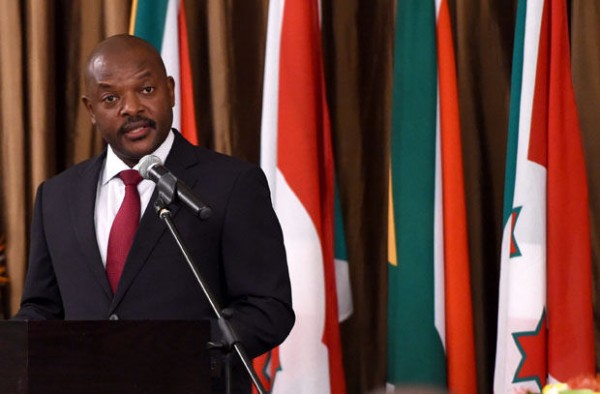
President of Burundi Pierre Nkurunziza addresses guests during the state banquet at Tuyhuis in Cape Town. (Photo: DOC)
By Eliza Keller
The east African nation of Burundi went to the polls last week in an election marred by violence, media suppression and human rights abuses. Burundi, a country roughly the size of Vermont, is in the midst of its worst crisis since 2005, when a tentative peace agreement ended 12 years of civil war. More than 170,000 men, women, and children have fled to neighboring Tanzania and Rwanda, putting a strain on already scarce resources.
The government of Burundi first held parliamentary elections in late June, despite pleas for postponement from the international community. The European Union and the African Union pulled out their election observers in advance of the elections, fearing that their presence would lend legitimacy to an illegitimate process. A few days later, the United States announced the cutoff of security assistance, and threatened to remove Burundi’s preferential trade status under the recently renewed African Growth and Opportunity Act (AGOA). In a statement at the time, the Department of State declared that the United States “regrets” President Pierre Nkurunziza’s decision to move ahead with elections.
The parliamentary elections were boycotted by seventeen political parties. Burundi’s electoral commission called turnout “enormous,” but media reports noted that streets in the capital of Bujumbura were deserted and polling stations at universities reported attendance in the single digits. A few days later, U.N. observers declared that the elections were not fair or free and that human rights were violated.
Last week’s presidential elections, in which President Nkurunziza won an unprecedented third term, were held after only a brief postponement, far from the months-long delay called for by Burundi’s neighbors and international partners. Secretary of State John Kerry called the vote “deeply flawed.” As the crisis continues, the international community stands by helplessly. Strongly worded press releases and finger-wagging denunciations are piling up at the feet of President Nkurunziza, who appears unfazed. (A few days after an attempted coup in May, the president was photographed playing soccer with friends while protests raged across Bujumbura.)
These bland public statements carry little influence, but the U.S. has few alternatives in its diplomatic repertoire. In the old days of diplomacy, the U.S. ambassador in Burundi would sit down with President Nkurunziza over Cuban cigars and hash out a compromise — perhaps an agreement to step down in exchange for an esteemed university professorship or, even better, a briefcase filled with crisp U.S. bills. Today, just the protocol involved in arranging such a meeting is deterrent enough. Programs like the Ibrahim Prize, a $5 million cash award granted to African leaders who voluntarily relinquish power, attempts to fill this void, but the prize has only been awarded twice in the last six years.
Of course, more transparent and responsible foreign policy is a good thing. But in a region in which relationships tend to carry more diplomatic weight than memos and mandates, this shift to modern diplomacy has come at the expense of diplomatic influence. The escalating situation in Burundi is evidence of the consequences.
The administration’s much-hyped “pivot to Asia” has brought political backing, diplomatic attention, and resources to a region of the world facing immense challenges. The United States’ leadership in brokering a nuclear deal with Iran shows us the potential of what can happen when these resources are brought to bear. In executing this pivot, however, the administration must not turn its back on the small but ambitious countries of Africa and Latin America. President Obama’s visit to Kenya this week represents an important opportunity for renewed U.S. commitment to the region, and the goodwill that it generates must not be squandered.
Despite dire appearances in Burundi, there is good news: The current U.S. ambassador to Burundi, Dawn Liberi, is not a political fundraiser, but a career diplomat with extensive experience living and working in sub-Saharan Africa. This is a lucky break for the United States. Ambassador Liberi must take pains to ensure that her voice remains strong, steady and assuring amid the gunfire and explosions plaguing Burundi’s capital. She and other diplomats must not isolate President Nkurunziza, but must remain engaged and empathetic.
There is still time for President Nkurunziza to graciously step down and, in doing so, preserve the state that he helped build and establish a legacy as an honorable and benevolent leader. With camaraderie and patience (and maybe a little cash), perhaps Ambassador Liberi and her colleagues can swing the pendulum away from an emerging dictatorship and toward a more peaceful, democratic future for the people of Burundi
Eliza Keller is Editor-in-Chief of the Columbia Journal of International Affairs and a Partner with the Truman National Security Project. She has more than ten years of experience in politics and public service; most recently, she served as Public Affairs Officer at the U.S. Millennium Challenge Corporation. Eliza is currently an MPA candidate at Columbia University and holds a B.S. in Foreign Service from Georgetown University.